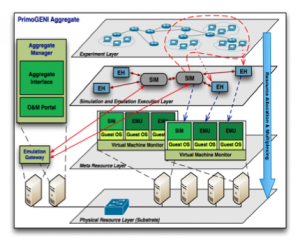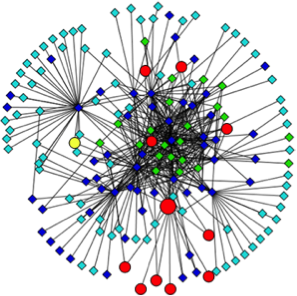Jason Liu
Research Profile
Dr. Jason Liu’s research focuses on parallel and distributed simulation, high-performance modeling and simulation of computer systems and computer networks. A central theme of his research is to investigate enabling technologies for building high-fidelity high-performance simulation and emulation testbeds to facilitate discoveries and innovations of large-scale complex computer networks and computer systems.
Specific areas of Dr. Liu’s research include:
- Enabling scalable and high-performance parallel and distributed simulation on high-end computing platforms. Dr. Liu’s research in parallel simulation has concentrated on advancing technologies for executing large-scale simulation models in parallel and distributed environments. Parallel simulation is an area crosscutting between modeling, simulation, and high-performance computing areas. Dr. Liu’s research focuses on development of high-performance simulation engines and design of efficient parallel algorithms to support massive-scale simulation experiments on modern high-end computing platforms. The parallel simulation techniques can readily be applied in studies of cyber-security systems, intrusion detection, cyber-security and cyber-defense assessment, and so on.
- Designing network testbeds based on hybrid simulation, emulation, and high-performance modeling techniques. The ability to conduct high-fidelity high-performance experiments is critic
 al to studying complex large-scale cyber systems, such as the cross-domain aspects of autonomous decision support systems, theeffectiveness of new defensive technologies for countering malicious cyber attacks, and so on. Dr. Liu’s research in this area consists of: 1) applying real-time techniques for immersive network modeling; 2) developing interactive simulation techniques supporting human-in-the-loop and machine-in-the-loop studies; 3) designing efficient models for representing large-scale network behaviors; and 4) designing techniques to facilitate efficient interactions between mathematical models, simulations, emulation, and physical systems.
al to studying complex large-scale cyber systems, such as the cross-domain aspects of autonomous decision support systems, theeffectiveness of new defensive technologies for countering malicious cyber attacks, and so on. Dr. Liu’s research in this area consists of: 1) applying real-time techniques for immersive network modeling; 2) developing interactive simulation techniques supporting human-in-the-loop and machine-in-the-loop studies; 3) designing efficient models for representing large-scale network behaviors; and 4) designing techniques to facilitate efficient interactions between mathematical models, simulations, emulation, and physical systems. - Applying high-performance modeling, parallel simulation, and interactive simulation and
 emulation techniques in various specific areas of research, including: 1) cyber-security systems, intrusion detection, security scenario analytics, cyber defense and training; 2) cyber-physical systems, smart grids, sensor networks, mission control, multi-model multi-environmentsystems, composite models, system of systems; 3) computer systems, scientific computing, parallel applications, parallel file systems, data center resource management, scheduling, data center networking; 4) wireless communication networks, cellular systems, mobile computing; and 5) other fields, including social networks, transportation systems, aviation, disaster response, and decision support systems.
emulation techniques in various specific areas of research, including: 1) cyber-security systems, intrusion detection, security scenario analytics, cyber defense and training; 2) cyber-physical systems, smart grids, sensor networks, mission control, multi-model multi-environmentsystems, composite models, system of systems; 3) computer systems, scientific computing, parallel applications, parallel file systems, data center resource management, scheduling, data center networking; 4) wireless communication networks, cellular systems, mobile computing; and 5) other fields, including social networks, transportation systems, aviation, disaster response, and decision support systems.
Previous Accomplishments
- Dr. Liu’s research has been funded by DARPA, NSF, and Raytheon BBN Technologies.
- Awards: NSF Career Award.
- Collaborations: Information Trust Institute at University of Illinois, University of Massachusetts, Los Alamos National Laboratory, Oak Ridge National Laboratory, Sandia National Laboratories.
Relevant Publications
- Liu, Jason, and Rong Rong. “Hierarchical Composite Synchronization.” Principles of Advanced and Distributed Simulation (PADS), 2012 ACM/IEEE/SCS 26th Workshop on. IEEE, 2012.
- Van Vorst, N., M. Erazo, and J. Liu. PrimoGENI for hybrid network simulation and emulation experiments in GENI. Journal of Simulation 6.3 (2012): 179-192.
- Van Vorst, Nathanael, and Jason Liu. Realizing Large-Scale Interactive Network Simulation via Model Splitting. Principles of Advanced and Distributed Simulation (PADS), 2012 ACM/IEEE/SCS 26th Workshop on. IEEE, 2012.
- Van Vorst, Nathanael, and Jason Liu. Realizing Large-Scale Interactive Network Simulation via Model Splitting. Principles of Advanced and Distributed Simulation (PADS), 2012 ACM/IEEE/SCS 26th Workshop on. IEEE, 2012.
- Van Vorst, Nathanael, Ting Li, and Jason Liu. How low can you go? Spherical routing for scalable network simulations. Modeling, Analysis & Simulation of Computer and Telecommunication Systems (MASCOTS), 2011 IEEE 19th International Symposium on. IEEE, 2011.
- Liu, Jason, and Yue Li. Parallel hybrid network traffic models. Simulation 85.4 (2009): 271-286.
- Erazo, M. A., Li, T., Liu, J., & Eidenbenz, S. (2012, June). Toward comprehensive and accurate simulation performance prediction of parallel file systems. In Dependable Systems and Networks (DSN), 2012 42nd Annual IEEE/IFIP International Conference on (pp. 1-12). IEEE.
- Li, Yue, Michael Liljenstam, and Jason Liu. Real-time security exercises on a realistic interdomain routing experiment platform. In Proceedings of the 2009 ACM/IEEE/SCS 23rd Workshop on Principles of Advanced and Distributed Simulation. IEEE Computer Society, 2009.